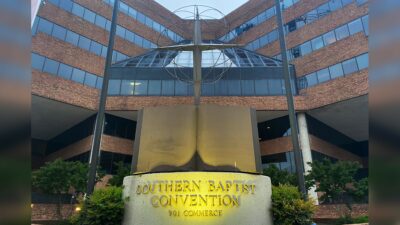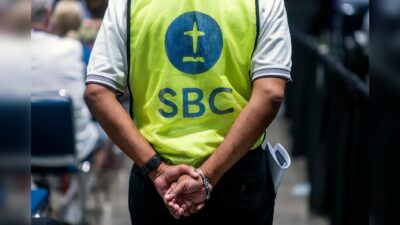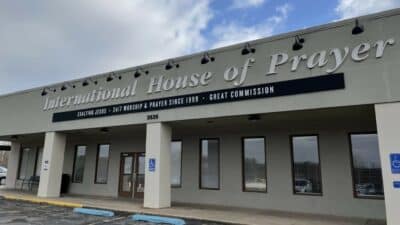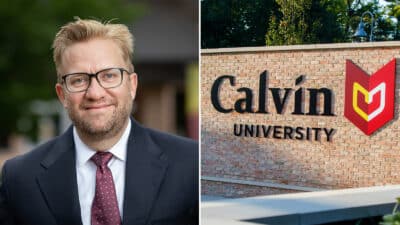Pressure is building on members of the Executive Committee of the Southern Baptist Convention to allow a third-party firm full access to investigate how it has handled allegations of sexual abuse over the past 20 years. This week, all six Southern Baptist seminaries expressed their dismay at the Executive Committee’s unwillingness to act.
“From my vantage point, the present situation is inexcusable and unacceptable,” Adam W. Greenway, president of Southwestern Baptist Theological Seminary in Fort Worth, Texas, tweeted on Tuesday, after the Executive Committee declined to waive attorney-client privilege in the probe for the second time in as many weeks.
“This is beyond disappointing and potentially damaging to the trust essential to the SBC,” tweeted Daniel Akin, president of Southeastern Baptist Theological Seminary in Wake Forest, North Carolina.
On Wednesday, trustees of the Baptist State Convention of Michigan passed a resolution calling on the Executive Committee to “fully abide” by the wishes of delegates, called messengers, calling for an investigation. The statement said it stood with survivors of sexual abuse “in an unyielding desire to see justice accomplished.”
And on Thursday, a group of 25 South Carolina pastors issued a statement, saying that if the Executive Committee does not comply, they will consider reallocating their donations away from the Executive Committee. It was followed by a group of 32 Texas pastors who implored the committee to waive privilege. All six SBC seminary heads have now spoken out on the issue.
Your tax-deductible gift helps our journalists report the truth and hold Christian leaders and organizations accountable. Give a gift of $30 or more to The Roys Report this month, and you will receive a copy of “Hurt and Healed by the Church” by Ryan George. To donate, click here.
Members of the Executive Committee have insisted they must shield certain communications from investigators despite the express wishes of Southern Baptists, whose chosen representatives voted in June to allow a transparent investigation of how the Executive Committee has handled sexual abuse.
A motion passed by delegates to the Southern Baptists’ annual meeting in June ordered the creation of a task force to oversee the hiring of an outside investigator and explicitly called on the Executive Committee to waive attorney-client privilege as it relates to communications between the denomination, its lawyers and sex abuse victims.
The denomination has been roiled for more than a decade by its members’ attempts to reckon with sexual abuse, including a push to establish a national database of known abusers. In 2020, the delegates to the annual meeting approved procedures for expelling churches that knowingly hire abusive clergy.
The Executive Committee’s response has long been to argue that the denomination’s bottom-up structure — where local churches choose their own clergy and govern their affairs — means that national Baptist entities are not responsible for the actions of abusive clergy.
In 2019, D. August “Augie Boto,” a former interim president of the Executive Committee and longtime staffer, said in an email that abuse advocates were part of “a satanic scheme to completely distract us from evangelism.”
The issue was brought to a head when an extensive investigation published that year by the Houston Chronicle and San Antonio Express-News revealed that about 380 Southern Baptist Church leaders and volunteers had faced allegations of sexual misconduct.
Earlier this year, leaked letters and secret recordings revealed the Executive Committee was slow to address sexual abuse, mistreated survivors and was generally more concerned with donations than with finding justice for the victims.
The crisis over waiving attorney-client privilege strikes at the heart of how the denomination, the largest Protestant group in the United States, is run. Southern Baptists have no bishops and are governed by the will of delegates called “messengers,” who meet once a year to conduct the denomination’s business. When the convention is not in session, the Executive Committee handles its affairs on behalf of the messengers.

But the Executive Committee, and its president and CEO, Ronnie Floyd, insist that the messengers’ motion does not bind them on the issue of attorney-client privilege.
“We are confident that the intent of the messengers to the 2021 annual meeting can be accomplished without risking unnecessary damage to the Southern Baptist Convention,” the Executive Committee said in a statement Thursday.
The members who oppose waiving privilege seem to be acting on the advice of the group’s lawyers, who have counseled the group not to allow investigators access to sensitive communications.
During a contentious five-hour meeting on Tuesday several of the 86 members of the committee argued that they risk costly lawsuits if they were to waive attorney-client privilege. Specifically, some said, the denomination’s insurance carrier might not pay damages if the privilege were waived and a court awarded damages to a sex abuse survivor.
At least four of the Executive Committee’s members are lawyers; all four are opposed to waiving attorney-client privileges.
Others on the committee, including its chairman, El Cajon, California, pastor Rolland Slade, are willing to give up attorney-client privilege. So, too, is SBC President Ed Litton, an ex-officio member of the Executive Committee.
The seven-member task force, led by Bruce Frank, a North Carolina pastor, acknowledged that waiving privilege may hold legal risks.
“Both our attorneys and the (Executive Committee) attorneys confirmed that any waiver of privilege at any time does create the risk that in a lawsuit related to a case where privilege is waived, the insurance company could argue that they are discharged from paying the judgment in that case due to waiver,” the statement said.
But the statement added: “It is impossible to follow the will of the Messengers and avoid this risk.”
Many Southern Baptists, including seminary heads, believe the potential risk of legal liability is worth it if the ultimate goal is to do justice to the victims.
“If we’ve done some things wrong that require restitution, then we need to make restitution,” said Akin, the seminary president. “If we’ve done things wrong and need to apologize, then apologize. We need to do the right thing for the right reasons and live out the faith we profess and trust that the Lord will provide for us and bless us if we do what is right.”
The Executive Committee is expected to meet once more on Tuesday, Oct. 5.
 Bob Smietana is a national reporter for Religion News Service. Yonat Shimron is a national reporter and senior editor for Religion News Service.
Bob Smietana is a national reporter for Religion News Service. Yonat Shimron is a national reporter and senior editor for Religion News Service.




















4 Responses
My family and I have been faithful financial contributors to the SBC (through local churches) for many years. In light of this decision, effective immediately I am initiating a review of those practices to ascertain what changes may be warranted.
Welcome to reality as the many who do not want to waive must, logically speaking, know that they are guilty. The guilty will never agree with this no matter how long they talk. So this is going to be up to the messengers to sort out at the next meeting. Abolishing this ruling council may be the only option. There is wickedness at the top and it has been that way for a long time. Getting rid of wicked leadership is not easy. People have presumed things to be much better than they have been and nothing will change that except for getting the whip out and getting rid of the greedy leaders.
By default or design the SBC have created an impasse to progress, across this demand to waive attorney-client privilege. Messengers can virtue-signal, with argument on their side. The executive can oppose the suspension of a crucial part of the American Constitution, again with argument on their side. In so doing, the impasse sustaining parties will find support for their respective positions, within and outwith the SBC community.
Within that swirling mix of secular and faith-community meaning-making is to be found great complexity and force. How that complexity and force will play out to see an impasse resolved, is far from clear.
I’m not a Baptist, but I do recall a quote from about 14 years ago, which might indicate the attitude of some of their leaders toward abuse victim advocates:
“Please realize that there are groups who claim to be one thing when in reality they are another. It would be great if the many groups who are claiming to be groups of advocacy and encouragement in ministry were that which they claim. Please be aware that there are groups that are nothing more than opportunistic persons who are seeking to raise opportunities for personal gain.”
Frank Page — pastor of Pebble Creek Baptist Church, Taylors SC
He worked for the denomination until retiring in 2018 to be closer to his family. If there were any morally inappropriate relationships involved in his sudden retirement, Pebble Creek probably had to just take his word for what happened, because the SBC never did any investigation.